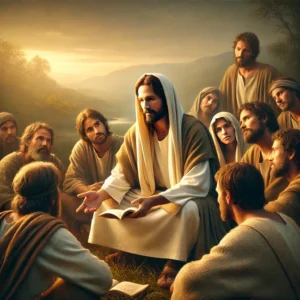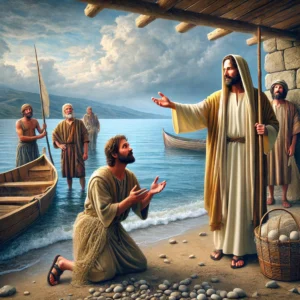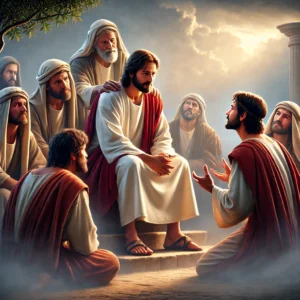
Throughout his ministry, Jesus’ relationship with his disciples was marked by profound leadership and mentorship. He not only taught them about faith and the kingdom of God but also prepared them to carry on his mission after his departure. By living alongside them, Jesus modeled the qualities of a servant leader and provided his disciples with hands-on experiences, equipping them to spread the gospel to the world. Let’s explore how Jesus mentored his disciples, instilling in them lessons about faith, leadership, and the mission of evangelism.
Calling the Disciples: A Personal Invitation

Jesus’ relationship with his disciples began with a personal call. He handpicked ordinary men—fishermen like Peter, James, and John, a tax collector like Matthew, and others from diverse backgrounds. In Matthew 4:19, Jesus called Peter and Andrew, saying, “Come, follow me, and I will send you out to fish for people.” This invitation symbolized a call to transformation—to leave their old lives behind and embrace a new purpose.
Jesus’ method of calling his disciples was highly personal. He didn’t gather scholars or leaders from religious institutions; instead, he chose those with humble beginnings and invested deeply in them. This shows that Jesus’ leadership began by recognizing potential in people others might have overlooked. His call to discipleship emphasized the power of relationship and the importance of willingness over status or qualifications.
Teaching by Example: The Model of Servant Leadership

One of the most impactful ways Jesus mentored his disciples was by leading by example. He didn’t just teach them through words but demonstrated what true leadership looked like. A central aspect of his mentorship was his embodiment of servant leadership. In John 13:1-17, Jesus famously washed his disciples’ feet—an act typically performed by a servant. After washing their feet, Jesus said, “I have set you an example that you should do as I have done for you” (John 13:15).
This moment highlighted that leadership, in Jesus’ vision, was about service and humility, not power or prestige. He modeled compassion, humility, and the willingness to care for others, setting a standard for his disciples to follow in their future leadership roles. Jesus showed that effective leaders are those who serve others selflessly, prioritizing their well-being over personal ambition.
Teaching Faith and Trust

Jesus consistently used everyday experiences to teach his disciples about faith and trust in God. Through parables, miracles, and conversations, he deepened their understanding of who God is and what it means to live in faith.
In Matthew 14:22-33, when Jesus walked on water, Peter—encouraged by Jesus—stepped out of the boat to walk toward him. When Peter began to sink, Jesus reached out and saved him, saying, “You of little faith, why did you doubt?” This incident taught the disciples the importance of trusting God, especially in the face of fear and doubt. Jesus used such moments to help his disciples grow spiritually, demonstrating that true faith often requires stepping out in confidence and relying on God, even when circumstances seem impossible.
In addition to performing miracles, Jesus often challenged his disciples’ understanding of faith through questions and stories. In the parable of the mustard seed (Matthew 17:20), he explained that even a small amount of faith can move mountains. These teachings encouraged his disciples to trust in God’s power and to exercise their faith as they took on leadership roles in the future.
Empowering the Disciples: Sending Them on Mission

Jesus didn’t merely teach his disciples—he empowered them to act. In Luke 9:1-6, he sent the twelve disciples out to preach the gospel, heal the sick, and cast out demons, giving them the authority to perform miracles in his name. This was a pivotal moment in their mentorship, as Jesus gave them hands-on experience in ministry, preparing them for the day when they would lead the early Church.
By sending them out, Jesus instilled in his disciples confidence in their calling and faith in God’s provision. He told them to “take nothing for the journey” (Luke 9:3), encouraging them to trust God for their needs. This early mission taught the disciples not only the practicalities of spreading the gospel but also the importance of dependence on God and partnership with others.
After their mission, the disciples returned to Jesus, sharing their experiences and learning from him once more. This balance of guidance, trust, and accountability shaped the disciples into effective leaders, teaching them that leadership is a dynamic process of growth, reflection, and action.
Addressing Their Failures: Lessons in Growth

Jesus was not afraid to address the failures and shortcomings of his disciples, knowing that correction was a critical part of their development. Several times throughout the Gospels, the disciples misunderstood Jesus’ teachings, displayed selfishness, or lacked faith. Instead of rebuking them harshly, Jesus used these moments as opportunities to help them grow.
For example, in Mark 10:35-45, James and John asked to sit at Jesus’ right and left in his kingdom, revealing their desire for status and honor. Jesus responded by teaching them that true greatness comes from serving others and that leadership in the kingdom of God is not about power but about sacrifice: “Whoever wants to become great among you must be your servant, and whoever wants to be first must be slave of all” (Mark 10:43-44).
Similarly, when Peter denied Jesus three times (Luke 22:54-62), Jesus later reinstated him by asking Peter three times, “Do you love me?” (John 21:15-17), and commissioning him to “feed my sheep.” Jesus didn’t abandon Peter for his failure, but restored and empowered him for future leadership, showing grace in moments of weakness and giving Peter a renewed sense of purpose.
Preparing for the Future: The Great Commission

After his resurrection, Jesus’ mentorship reached its climax in the Great Commission. In Matthew 28:19-20, Jesus told his disciples, “Therefore go and make disciples of all nations, baptizing them in the name of the Father and of the Son and of the Holy Spirit, and teaching them to obey everything I have commanded you.” This commandment set the stage for the spread of Christianity across the world and gave the disciples their final mission.
Jesus entrusted his disciples with the responsibility of continuing his work, teaching them that their leadership was not just about managing a small group but about spreading the gospel to all nations. This commissioning emphasized the global scope of their mission and underscored the importance of discipleship, as they were called to create new leaders who would continue the work of spreading the gospel.
The Role of the Holy Spirit in Their Leadership

As part of his mentorship, Jesus promised the disciples that they would not lead alone. He told them that the Holy Spirit would come to guide and empower them after his departure. In John 14:26, Jesus said, “But the Advocate, the Holy Spirit, whom the Father will send in my name, will teach you all things and will remind you of everything I have said to you.” This promise was fulfilled at Pentecost (Acts 2), when the Holy Spirit descended upon the disciples, giving them boldness, wisdom, and the ability to perform miracles in Jesus’ name.
The role of the Holy Spirit was crucial in continuing the mentorship that Jesus began, providing the disciples with the strength and guidance needed to carry out their mission. The Spirit became their ultimate teacher, leading them into all truth and equipping them to lead the early Church effectively.
Conclusion
Jesus’ relationship with his disciples was marked by deep mentorship and leadership, through which he transformed ordinary men into leaders who would change the world. His approach combined teaching by example, empowerment, addressing failures with grace, and preparing his disciples for the future. By serving as both leader and mentor, Jesus equipped his disciples with the tools they needed to spread the gospel, model servant leadership, and ultimately fulfill the Great Commission. This relationship not only shaped the foundation of the early Church but continues to inspire Christian leaders today.



